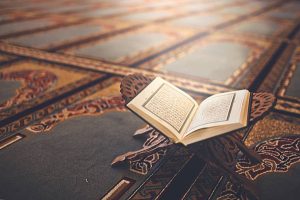
1. When wearing your clothing, recite the following dua:
اَلْحَمْدُ لِلّٰهِ الَّذِيْ كَسَانِيْ هٰذَا الثَّوْبَ وَرَزَقَنِيْهِ مِنْ غَيْرِ حَوْلٍ مِّنِّيْ وَلَا قُوَّةٍ
All praise is due to Allah Ta‘ala who has clothed me with this clothing and granted it to me without any effort or ability from my side.
Note: The virtue of reciting the abovementioned dua is that all one’s previous minor sins will be forgiven.[1]
2. When wearing new clothing, recite the following duas:
Dua One:
اَلْحَمْدُ لِلّٰهِ الَّذِيْ كَسَانِيْ مَا أُوَارِيْ بِهِ عَوْرَتِيْ وَأَتَجَمَّلُ بِهِ فِيْ حَيَاتِيْ
All praise is due to Allah Ta‘ala who has clothed me with such clothing through which I am able to conceal my private parts, and through which I am able to beautify myself in my life.
عن أبي أمامة قال: لبس عمر بن الخطاب ثوبا جديدا فقال: الحمد لله الذي كساني ما أواري به عورتي وأتجمل به في حياتي ثم عمد إلى الثوب الذي أخلق فتصدق به ثم قال: سمعت رسول الله صلى الله عليه وسلم يقول: من لبس ثوبا جديدا فقال: الحمد لله الذي كساني ما أواري به عورتي وأتجمل به في حياتي ثم عمد إلى الثوب الذي أخلق فتصدق به كان في كنف الله وفي حفظ الله وفي ستر الله حيا وميتا (سنن الترمذي، الرقم: ٣٥٦٠)[2]
Hazrat Abu Umaamah (radhiyallahu ‘anhu) reports that on one occasion, Hazrat Umar (radhiyallahu ‘anhu) I wore a new garment and recited the abovementioned dua. He then gave his old garment in charity and said, “I heard Rasulullah (sallallahu ‘alaihi wasallam) saying, ‘Whoever wears a new garment and recites the (abovementioned) dua, and then he takes his old garment and gives it in sadaqah, he will remain in the special protection, security and cover of Allah Ta‘ala while living and after passing away.’”
Dua Two:
اَللّٰهُمَّ لَكَ الْحَمْدُ أَنْتَ كَسَوْتَنِيْهِ أَسْأَلُكَ مِنْ خَيْرِهِ وَخَيْرِ مَا صُنِعَ لَهُ وَأَعُوْذُ بِكَ مِنْ شَرِّهِ وَشَرِّ مَا صُنِعَ لَهُ
O Allah Ta‘ala, to You alone belongs all praise. You have clothed me with this (new garment). I ask You for its good (that it may be a means of causing me to be grateful and recognizing Your favour upon me), and the good (benefits) for which it was made, and I seek Your protection from its evil (that it may be a means of me being ungrateful or haughty and proud) and the evil for which it was made (using it in an impermissible way).
عن أبي سعيد قال: كان رسول الله صلى الله عليه وسلم إذا استجد ثوبا سماه باسمه عمامة أو قميصا أو رداء ثم يقول: اللهم لك الحمد أنت كسوتنيه أسألك خيره وخير ما صنع له وأعوذ بك من شره وشر ما صنع له (سنن الترمذي، الرقم: ١٧٦٧)[3]
Hazrat Abu Sa’eed Khudri (radhiyallahu ‘anhu) reports that when Rasulullah (sallallahu ‘alaihi wasallam) would wear any new clothing, he would refer to the cloth by mentioning its name (e.g. a shawl or a turban), and then he would recite the following dua:
اَللّٰهُمَّ لَكَ الْحَمْدُ أَنْتَ كَسَوْتَنِيْهِ أَسْأَلُكَ مِنْ خَيْرِهِ وَخَيْرِ مَا صُنِعَ لَهُ وَأَعُوْذُ بِكَ مِنْ شَرِّهِ وَشَرِّ مَا صُنِعَ لَهُ
3. When removing your clothing, recite the following dua:
بِسْمِ اللهِ الَّذِيْ لَا إِلٰهَ إِلَّا هُوَ
In the name of Allah Ta‘ala, besides whom there is no deity
عن أنس رضي الله عنه قال: قال رسول الله صلى الله عليه وسلم: ستر ما بين أعين الجن وعورات بني آدم أن يقول الرجل المسلم إذا أراد أن يطرح ثيابه بسم الله الذي لا إله إلا هو (عمل اليوم واليلة، الرقم: ٢٧٢، الأذكار للنووي، الرقم: ٥٣)[4]
Hazrat Anas (radhiyallahu ‘anhu) reports that Hazrat Rasulullah (sallallahu ‘alaihi wasallam) said, “The veil between the eyes of the jinn and the private parts of a person is that at the time of removing his clothes, he recites the (abovementioned) dua.
4. When seeing someone wearing new clothing, recite the following duas:
Dua One:
اِلْبَسْ جَدِيْدًا وَعِشْ حَمِيْدًا وَمُتْ شَهِيْدًا
May you wear new clothing, lead a praiseworthy life, and pass away as a martyr.
عن ابن عمر قال: رأى النبي صلى الله عليه وسلم على عمر بن الخطاب رضي الله عنه ثوبا أبيض فقال: أجديد قميصك أم غسيل فقال: بل جديد فقال النبي صلى الله عليه وسلم: البس جديدا وعش حميدا ومت شهيدا (صحيح ابن حبان، الرقم: ٦٨٩٧)
Hazrat Ibnu Umar (radhiyallahu ‘anhu) reports that on one occasion, Rasulullah (sallallahu ‘alaihi wasallam) saw Umar I wearing a white garment. Rasulullah (sallallahu ‘alaihi wasallam) asked him, “Is your garment new, or is it (an old garment that you have) washed?” Umar I replied, “It is new.” Rasulullah (sallallahu ‘alaihi wasallam) then made dua for him by reciting the abovementioned words.
Dua Two
أَبْلِ وَأَخْلِفْ ثُمَّ أَبْلِ وَأَخْلِفْ ثُمَّ أَبْلِ وَأَخْلِفْ
May you wear it until it is old and thereafter replace it, and then may you wear it until it is old and thereafter replace it, and then may you wear it until it is old and thereafter replace it (i.e. may Allah Ta‘ala bless you with barakah in your clothing, so that it remains for a long time, and may He continue to bless you with new clothing whenever your clothing needs to be replaced).[5]
5. When you intend wearing any new clothing, then it is preferable for you to wear it for the first time on a Friday.[6]
عن أنس رضي الله عنه قال كان رسول الله إذا استجد ثوبا لبسه يوم الجمعة (شرح السنة للبغوي، باب ما يقول إذا لبس جديدا)[7]
Hazrat Anas (radhiyallahu ‘anhu) reports that when Rasulullah (sallallahu ‘alaihi wasallam) intended to wear any new clothing, he would commence wearing it on the day of Jumu’ah.
[1] سنن أبي داود، الرقم: ٤٠٢٣، المستدرك على الصحيحين ، الرقم: ٧٤٠٩، وقال: هذا حديث صحيح الإسناد ولم يخرجاه، وقال الذهبي: أبو مرحوم ضعيف
[2] وقال: هذا حديث غريب وحسنه الحافظ في نتائج الأفكار ١٢٦/١
[3] وقال: هذا حديث حسن
[4] ويتقوى بمجموع طرقه كما في تعليق الشيخ محمد عوامة على المصنف ٣٥١،٣٥٢/١٥
[5] صحيح البخاري، الرقم: ٣٠٧١
[6] فالمنصوص أنه يستحب في الجمعة والعيدين لبس أحسن الثياب وفي شرح الملتقى من فصل اللباس ويستحب الأبيض (رد المحتار ١٥٠/٢)
[7] قال القاري: وعند ابن حبان من حديث أنس قال كان رسول الله إذا استجد ثوبا لبس يوم الجمعة وكذا رواه الخطيب والبغوي في شرح السنة فالمعنى إذا أراد أن يلبس ثوبا جديدا بدأ لبسه يوم الجمعة (مرقاة المفاتيح ١٥٠/٨) ولم نجده في نسخة ابن حبان عندنا
 Ihyaaud Deen An Effort to Revive Deen in Totality
Ihyaaud Deen An Effort to Revive Deen in Totality



